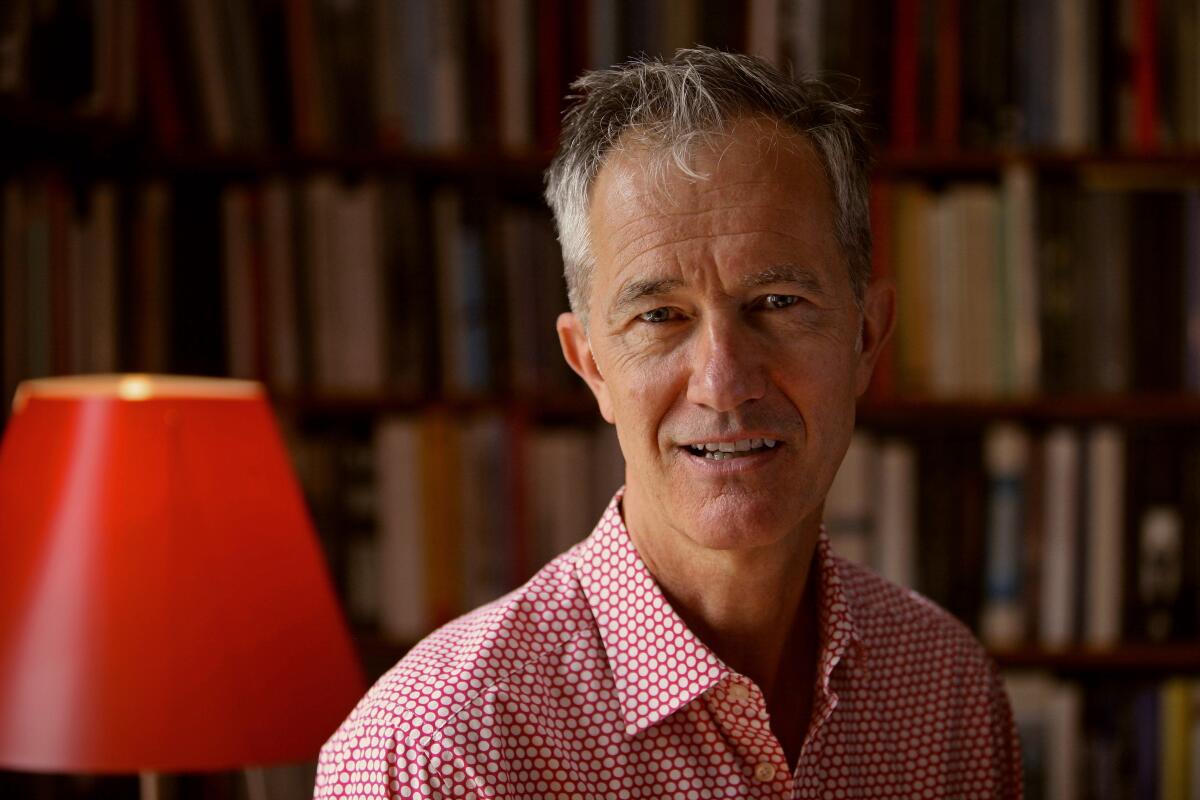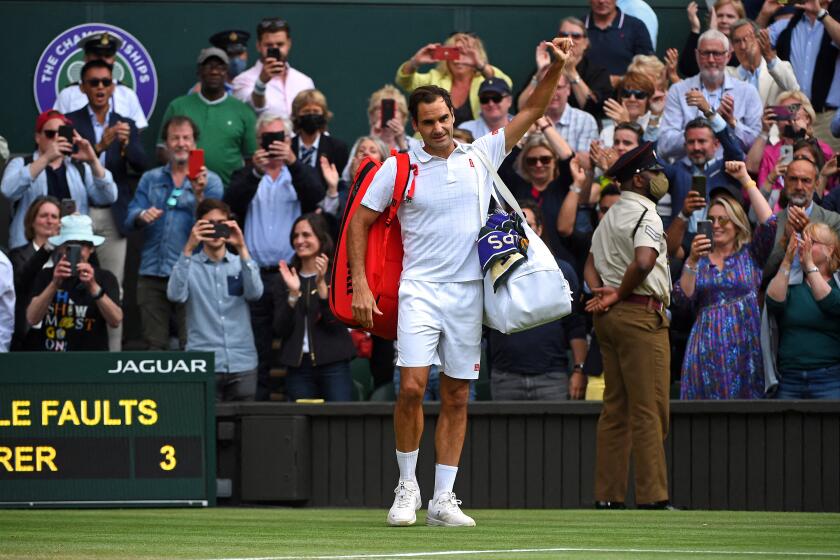In Geoff Dyer’s U.K. childhood, a Cadbury Milk Tray meant everything

- Share via
Book Review
Homework
By Geoff Dyer
Farrar, Straus and Giroux: 288 pages, $29
If you buy books linked on our site, The Times may earn a commission from Bookshop.org, whose fees support independent bookstores.
A certain sort of British memoir takes education as its queasy, pivotal center. The narrators of these books — among them Robert Graves’ WWI-scarred reminiscence, “Good-Bye to All That” (1929), and Henry Green’s WWII-era bildungsroman, “Pack My Bag” (1940) — are often tortured by their schooling, with its wicked authority figures and cruel classmates. Importantly, they refuse to be tight-lipped about the experience. They usually — in the cases of the above, always — end up at Oxford, where their tenure at such an ideal of English education allows their adult selves to come into view.
Geoff Dyer is among the great uncategorizable prose writers of the past several decades and he also went to Oxford, albeit at the end of the 1970s, with the war deprivations of yore in rearview. He was not reared by British public academies — the privileged equivalent of private schools in America — but instead at a grammar in suburban Cheltenham, “a place famed for its Jane Austeny terraces,” he states in his new autobiography, “Homework,” though his alma mater stuck out like a jagged edge: It “was, by some distance, the most forbidding modernist building in town.”
“Homework” distinguishes itself like such a structure among the developed, dreary grounds of the British scholastic narrative. No fan of Dyer’s, whose many books have ranged from a bizarre if thrilling immersion in the psyches of American jazz musicians to a volume about procrastinating while trying to write about D.H. Lawrence, will be surprised that he departs from precedent. But even if his latest never actually takes us to university (“Oxford lies beyond the boundaries of this book-map and inventory,” he announces), it reflects U.K. literary custom like nothing he’s written. Dyer, now 67 years old and for a decade a USC professor, is a cosmopolitan author whose output — fiction, nonfiction, both — has often spanned far-flung locales. Yet this project’s geography is circumscribed, its borders hedged. If Dyer has grown sentimental about the England of his upbringing, his nostalgia is a subtle critique of how optimism in big government has grown worse for wear — “Homework” bursts with working-class pride, a fond and mournful belief in the possibility of the British welfare state.
Dyer’s gloriously shape-shifting literary project — intensely perceptive, essayistic memoir — continues with “The Last Days of Roger Federer.”

Still, the fact of remembering can sometimes feel more important to Dyer than how events translate. He leads us through a grove of anecdotes, some more meaningful than others. Dyer conjures a macabre, powerful image of his father in a hospital bed after a botched surgery, wearing a badge that reads “Private Health Care Makes Me Sick,” and spends a few too many pages on the delight of eating “sweets” (not candy — too Yankee), which nonetheless produces this glorious quip: “During one discussion of various oral afflictions, my mum exclaimed ‘I’ve had gum boils,’ as if announcing an achievement that was in danger of being unjustly overlooked.”
Humor is his life raft because he neglects to plot much of a course around the seas of memory. The book’s languor can be ponderous and vintage, more 20th century than 21st. Yet the text’s unhurried recollections reflect its content: “Homework” feels leisurely as if to reflect the functional, socialist-adjacent government that allows its characters to subsist. If only, Dyer implies, Americans with the misfortune of paying for their own dental care could afford the rite of developing gum boils.
Eventually, Dyer’s aimlessness gets us somewhere — and, in the most English way, we find the book’s emotional destination in what he neglects to proclaim outright. Dyer, an only child, spends a lot of time delving into his relationship with his parents, focusing on moments when he butts heads with his dad. Young Geoff, child of an expanding consumer economy, wants a guitar, a stereo, a Red Feather racing bike — “If you didn’t have a racer you didn’t have a bike,” his older self declares with undiminished enthusiasm, “but since no one who had a bike didn’t have a racer this wasn’t an issue.”
He receives all of these things. His dad is a sheet metal worker, his mother a school cook, and they have limited financial means — still, the book’s contrast, between familial impecunity and the minor damage of the narrator’s disappointments, forces us to look past circumstance and consider how materialism relates to affection and if this conflict is generational. Dyer’s father was traumatized by the austerity of growing up in England between two military cataclysms, and his daily satisfaction is bound in his ability to pinch pences. In one particularly memorable scene, he buys his son a tennis racket at a store that offers a 10% discount to members of an athletic club — to which he doesn’t belong, but he argues his way into getting the deal regardless. In another, Dyer describes a Cadbury Milk Tray that his dad purchased for his mother each year on Valentine’s Day though his mom didn’t like chocolate. This did not dampen her gratitude, however: The gesture “was an expression of indulgence unrestrained by any considerations of expense.”
Naturally, most of the contents of the Milk Tray were eaten by me, first the ones I knew I liked from the top layer and then, when that top layer had been decimated, the same items from the bottom layer. This bottom layer also came to include what my Auntie Hilda called ‘spit-backs’ from the top layer: half-eaten choices that I’d liked the look of — based on the legend — but then turned against when I took a bite. And so, to avoid waste, they were returned to the box for someone else — my dad — to finish off.
This moment sticks in the mind, the intimacy of a family in which a present for the mother becomes a treat for the child, whose chewed and discarded food is finished by the father. It points toward the book’s core: a question of how to distinguish tenderness from frugality. Is “Homework” about a child who took a remarkably frictionless path, aided by a nation that had invested in civic institutions, from monetary hardship to the ivory tower? Merely technically. Is it a story of how members of a family, protected by a social safety net from abject desperation, developed different ideas about how to relate to material circumstance? We’re getting there.
Geoff Dyer is an idiosyncratic literary observer, a Brit who regularly writes for the London Review of Books.
What “Homework” does best is keep these possibilities open while never having an answer for whether the elder Dyer’s annual ceremony with the Cadbury box was an act of love. The real homework is the labor that we do when we spend our whole lives wondering.
Felsenthal is a fiction writer, poet, critic and essayist whose work has appeared in the New Yorker, the Guardian, the Atlantic and other publications.
More to Read
Sign up for our Book Club newsletter
Get the latest news, events and more from the Los Angeles Times Book Club, and help us get L.A. reading and talking.
You may occasionally receive promotional content from the Los Angeles Times.










